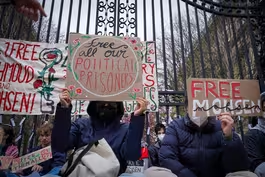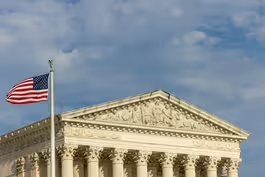
Economic forecasts show global impact of Trump tariffs
Clip: 4/22/2025 | 7m 51sVideo has Closed Captions
Economic forecasts show Trump's tariffs having major global impact
President Trump’s trade wars are likely to slow down economic growth across the globe significantly this year, according to projections from the International Monetary Fund. And Treasury Secretary Bessent reportedly told investors that he believes the trade war with China is unsustainable and hopes tariffs on both sides could be eased. Geoff Bennett discussed more with Ron Insana.
Problems playing video? | Closed Captioning Feedback
Problems playing video? | Closed Captioning Feedback
Major corporate funding for the PBS News Hour is provided by BDO, BNSF, Consumer Cellular, American Cruise Lines, and Raymond James. Funding for the PBS NewsHour Weekend is provided by...

Economic forecasts show global impact of Trump tariffs
Clip: 4/22/2025 | 7m 51sVideo has Closed Captions
President Trump’s trade wars are likely to slow down economic growth across the globe significantly this year, according to projections from the International Monetary Fund. And Treasury Secretary Bessent reportedly told investors that he believes the trade war with China is unsustainable and hopes tariffs on both sides could be eased. Geoff Bennett discussed more with Ron Insana.
Problems playing video? | Closed Captioning Feedback
How to Watch PBS News Hour
PBS News Hour is available to stream on pbs.org and the free PBS App, available on iPhone, Apple TV, Android TV, Android smartphones, Amazon Fire TV, Amazon Fire Tablet, Roku, Samsung Smart TV, and Vizio.
Providing Support for PBS.org
Learn Moreabout PBS online sponsorshipAMNA NAWAZ: Welcome to the "News Hour."
President Trump's trade wars are likely to# slow down economic growth across th.. significantly this year.
That is the projection# from the International Monetary Fund today,## estimating the U.S. economy will slow down by an# entire percentage point compared to last year,## growing by just 1.8 percent.
Global growth was# projected to slow by half of a percentage point.
GEOFF BENNETT: Tariffs and uncertainty are# rattling other important parts of the economy.## The dollar has continued its slide,# and investors are showing that they## have new worries about treasury bonds,# often some of the safest investments.
But the U.S. markets rebounded# substantially today.
That came## after Treasury Secretary Scott Bessent# reportedly told investors that he believes## the trade war with China is unsustainable and# hopes tariffs on both sides could be eased.
The Dow gained back more than 1,000 points,## or 2.6 percent.
The Nasdaq jumped 2.7 percent.# And the S&P 500 also gained about 2.5 percent.
And, late today, President Trump suggested he was# open to easing up on the trade wars with China.
DONALD TRUMP, President of the United# States: I'm not going to say, oh,## I'm going to play hardball with China.
I'm goi.. no.
We're going to be very nice.
They're going# to be very nice.
And we will see what happens.
But, ultimately, they have# to make a deal, because,## otherwise, they're not going to be# able to deal in the United States.
GEOFF BENNETT: To help us understand the# volatility in the markets, let's turn now## to longtime financial journalist# and CNBC contributor Ron Insana.
Ron, it's great to be able# to draw on your insights on## a day like today.
Thanks for being here.
RON INSANA, CNBC Contributor: I was hoping# to get some insights from you, Geoff.
(LAUGHTER) GEOFF BENNETT: We will see about that, friend.
RON INSANA: This is as much volatility# as I h.. GEOFF BENNETT: Well, let's talk about that,## because the treasury secretary reportedly# saying h.. president's trade war with China.
You# heard the president there himself.
What's your read on all that's happening?
And# what is this potentially setting the stage for?
RON INSANA: Well, they're most clearly and most# definitively listening to the financial markets,## as you both outlined at the top of the show.
I# mean, not only is global growth being downgraded.## U.S. growth is being downgraded, the IMF# actually behind private economists in doing that.
And then you have seen these ripples in# the Treasury market, the decline in the## dollar to a three-year low, the turmoil in# the stock market.
And financial instruments## are telling politicians, number one, moving# this fast without a plan is a very bad idea.
Some of the ideas themselves are bad, like# potentially firing Fed Chairman Jay Powell.## And also just engaging in an all-out# trade war is detrimental to growth,## if not devastating, should it become# a full-blown international event.
And so I think they're starting to# get the message, and particularly## the treasury secretary is probably trying to# talk the president off the ledge, as it were,## with respect to some of the more harsh comments# he's made about Jay Powell recently and also about## this intensifying trade war with China, which the# treasury secretary effectively called an embargo.
That's a big word to use in# an environment like this.
GEOFF BENNETT: Well, you mentioned the# markets.
And let's talk more about that,## because, before today's rally, The Wall# Street Journal noted that the Dow Jones## industrial average was headed for the# worst April since the Great Depression,## since 1932, because of a lack# of confidence by investors.
I mean, is this -- this period of volatility,## is this our new normal, at least for as long# as this tariff plan, this trade war lasts?
RON INSANA: Yes, I absolutely think volatility# is going to remain elevated, I mean, maybe not## to the extent that we saw in the last several# weeks, but I do think that, until we get clarity## around where these negotiations are going and what# the actual endgame is, what we want from each and## every one of our trading partners is clear, and# whether or not there are agreements to be had.
Remember, these often take months or years# to construct, and they're trying to do## multiple deals, as many as 70 deals, within# 90 days.
That's something that I would assume## is impossible.
Progress on this front would# be helpful to financial markets, to be sure.
But the issues around that, whether or not# we have a fully set of sustainable deals that## are long-term in nature, is really what the# market needs to calm down and start following## more traditional metrics like corporate# earnings, the direction of interest rates,## should lower rates be warranted, things like# that, that are germane to typical market behavior.
GEOFF BENNETT: Well, the# president, at least for today,## is easing up on China.
He's also# easing up apparently on the Fed chair,## Jay Powell.
Today he told reporters, he# said: "I have no intention of firing him."
Last week, he said -- quote -- "If I want him out,# he will be out of there real fast, believe me."
He's still voicing -- the president is still# voicing his desire for the Fed to cut rates.## Is the Fed strong enough to resist the# pressure?
Because not every institution,## not every American institution, as we have seen,## has been strong enough to resist the# pressure from the Trump administration.
RON INSANA: Yes, I think the Fed most# definitely is.
I think Jay Powell has## even said, both privately and maybe even publicly,## that he would spend every last nickel# that he has fighting to stay in his job.
And the Fed, as an institution, has been extremely# independent as an agency for quite some time.
And,## again, I think that the independence# of the Fed is critical to the safety## and soundness of U.S. assets, the# way foreigners view the stability## of the U.S. economy, the reliability# of the dollar or U.S. Treasury bonds.
All of those things are really important.
Now, the# Fed may still hear from Donald Trump, President## Trump, on an ongoing basis about lowering rates,# but the Fed will do what it does when it needs## to do it.
So I think this is going to be no# longer a test of wills.
I think Jay Powell now,## given that the president just said that today,# that he has no intention of firing Jay Powell,## which my colleague Eamon Javers at CNBC asked him# about, I think we're OK until his term expires.
Who he ultimately replaces him with is# an open question.
But I think the Fed,## now that the president has backed off,# will be able to withstand these pressures.
GEOFF BENNETT: And lastly, Ron, when the IMF,# the International Monetary Fund, slashes its## us and global economic forecasts, it says the# U.S. economy is expected to grow by about 1.8## percent -- that's down from its January estimate# of 2.7 percent -- put that in plain English.
What does that mean for the economy and# the prospects potentially of a recession?
RON INSANA: Well, the IMF appears to be# slightly more optimistic than most private## economists.
We have heard estimates that# there's as much as a 90 percent chance of## a recession if these tariffs remained# in place for a sustained period.
And so, personally, I think 1.8 percent# is a little bit optimistic if the tariff## negotiations go on for several more months.# We're already hearing that shipments of goods## from China have all but ceased and that ports# in Los Angeles and Long Beach, California,## have quieted down considerably# and not receiving a lot of goods.
And so these are long cycle types of phenomenon# that if indeed this were to persist for some time,## getting 1.8 percent growth would be a# victory, given that we grew about 2.5## percent last year.
My guess is that we're# going to grow under 1 percent this year## if this type of uncertainty persists, both# in terms of market behavior and ultimately## in terms of businesses' inability to plan# around the tariffs, whatever they might be.
This is -- as I said earlier, this is going# to take time to work out.
So the first two or## three-quarters of this year might be a little# bit weaker than even the IMF is suggesting.
GEOFF BENNETT: That is Ron Insana.
Ron, always a pleasure.
Thanks for being with us.
RON INSANA: Thanks for having me.
Foreign policy experts on Trump's student activist crackdown
Video has Closed Captions
Clip: 4/22/2025 | 8m 45s | Foreign policy experts offer views on Trump administration's student activist crackdown (8m 45s)
'Love, Queenie' chronicles life of actress Merle Oberon
Video has Closed Captions
Clip: 4/22/2025 | 6m 53s | New book 'Love, Queenie' chronicles life of trailblazing South Asian actress Merle Oberon (6m 53s)
Student loan collections to resume for borrowers in default
Video has Closed Captions
Clip: 4/22/2025 | 6m 29s | Student loan debt collections to resume for borrowers in default (6m 29s)
Supreme Court hears school curriculum, parental rights case
Video has Closed Captions
Clip: 4/22/2025 | 7m 17s | Supreme Court hears major case on public school curriculum and parental rights (7m 17s)
Vatican plans for Francis' funeral amid conclave speculation
Video has Closed Captions
Clip: 4/22/2025 | 6m 33s | Vatican plans for Pope Francis' funeral as conclave speculation intensifies (6m 33s)
Providing Support for PBS.org
Learn Moreabout PBS online sponsorship
- News and Public Affairs

FRONTLINE is investigative journalism that questions, explains and changes our world.

- News and Public Affairs

Amanpour and Company features conversations with leaders and decision makers.












Support for PBS provided by:
Major corporate funding for the PBS News Hour is provided by BDO, BNSF, Consumer Cellular, American Cruise Lines, and Raymond James. Funding for the PBS NewsHour Weekend is provided by...




